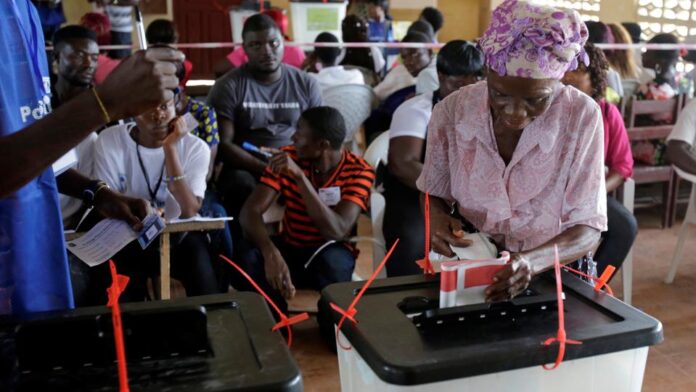A man collapses, tears on his cheeks. At his side, his neighbour holds the murder weapon in his hand. This scene entitled “war” is the image of violence for the young Liberian who drew it and will vote on Tuesday for the first time.
In a classroom of this school in Buchanan, about 150 km east of Monrovia, young people between 18 and 25 years old took turns standing up to illustrate with marker what they fear above all else, the return of violence.
In Liberia, a country ravaged by civil wars which left 250,000 dead between 1989 and 2003, the peaceful conduct of the presidential and legislative elections on October 10 is a major issue. The death of three people on Friday in the northwest during clashes between supporters of the two main political forces, as well as the declarations of certain leaders, have heightened concern.
“What is violence?”, asks Nehemiah Jallah, 24, at the origin of this local initiative aimed at promoting peace. Eighty young people are facing him, sitting behind their small wooden desks. “Violence is when you force someone to do something,” replies one of them. “It’s when we seek to do harm,” notes another.
“Young people must stay away from all forms of violence. When violence intensifies, homes are destroyed, innocent people are killed,” explains Nehemiah Jallah. “I don’t know which party you support, but vote peacefully, don’t be violent. Too many elections in the world end in violence. Let’s keep our country in peace,” he implores.
Everyone is wondering about the attitude to adopt in the event of cheating during voting. Despite the honking of car horns on the neighbouring road, the cries of a newborn in his mother’s arms and an orchestra passing by for a funeral, the young people are passionate about the discussion.
The organizers put up posters preaching non-violence around the room. “Vote for peace in Liberia. Say no to violence”, and “Respecting the rule of law will save our democracy”.
More than 60% of the Liberian population is under 25 years old. “Politicians seek to use you because they know that you are more vulnerable,” explains Lawrence Sergbou, who presents himself as a youth activist.
Liberia’s history is punctuated by violence. During the civil war, militias used child soldiers, he recalls. The violence destroys all hope of development, he judges. “When we look at social networks, listen to the radio, see the history of the country… Yes, I’m afraid,” he confides. “We have lived in peace for 20 years and we don’t want it to end. ”
Despite the atrocities of the civil war, with massacres, mutilations, rapes, and acts of cannibalism, no trial has to date been held in Liberia. Some former warlords still play an influential role in politics.
One of them is Prince Johnson, who a video showed sipping a beer while his men tortured President Samuel Doe to death in 1990. He is still a senator.
At 71, he formed an alliance with Joseph Boakai, former vice president (2006-2018) and one of the favourites in the presidential election. He threatened a popular revolt if the ruling party manipulated the elections. Shortly after, candidate Boakai suggested that it would be “the end of this country” if the election was stolen.
Former football star George Weah, president since 2018 and seeking a second term, promised “ peaceful, fair and credible” elections.
In April, all competing parties signed a commitment under the auspices of the UN and the West African Community (ECOWAS) to refrain from violence and to use judicial institutions to resolve electoral conflicts.
SOURCE: africanews.com





